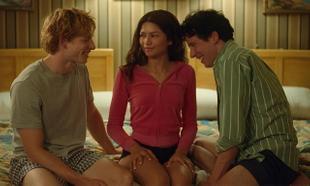For reasons unknown, the American troops that reached the residence of Heinrich Himmler in 1945 disobeyed orders to hand over any and all documents found and held onto the private correspondence of the man behind the Final Solution. Lost for over fifty years, they form the basis of The Decent One, a documentary that peeks behind the monster to find the human.
Using this treasure trove of letters and diary entries belonging to Himmler, wife Marga, daughter Gudrun, stepson Gehbard and Himmler’s mistress Hedwig, The Decent One paints an intimate portrait of Himmler that underscores the disconnect between the soldier/mass murderer and the loving husband/doting father. Utilising unseen actors to read from the letters, Israeli director Vanessa Lapa resists the temptation for talking heads, reconstructions and narration, letting the tender words coil around the poison images.
Himmler’s early diary entries illustrate that the future meeting of Himmler and Hitler would be a meeting of minds; his boyhood diary observes the violence of WWI with great interest, the shame of Germany’s loss, and his desire to join the militia at a young age. By 1919 he longs for another war to right the wrong of the Treaty of Versailles, he wonders what is the answer to ‘the Jewish question’, and wishes for 'living space in the east.'
The director overlaps this harsh political stance with the soft family man depicted in the letters he writes home. "People don’t like me," he notes in college in the early twenties. He meets and falls for Marga, whom calls him Heini, on a train, and worries about the 'horrors of the future' and the effect that will have on his wife and his daughter Gudrun, with whom he has a special bond. As the party rises to power and marches towards war, Himmler spends less and less time at home; their trivial correspondences of what car to purchase and the cost of the upkeep of their home are juxtaposed with images of war and slaughter and humiliation. At one point, against images of starving inmates and executions, Himmler writes that despite the volume of 'work' he is happy and sleeping well. Later, he remarks that Jews, homosexuals, gypsies and other 'nuisances' are nothing more than animals, and as the war turns against Germany he muses that the German soldiers and generals are ‘decent men’.
Alas there is where insight into how Himmler's obliviousness of his morally reprehensive actions stop. The documentary plateaus as Lapa seems to be making the same point over and over again. But for the most part, this journey into the banality of evil is a fascinating one.








































































